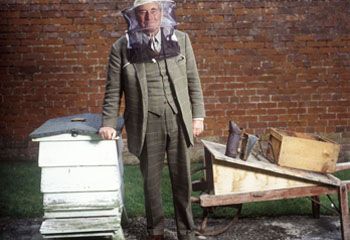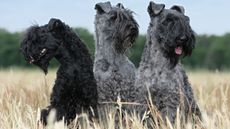National treasures: Beekeeper
Beekeeping has hardly changed in over a century, and you can still get stung doing it.


Willie Robson, from Berwick upon Tweed, Northumberland
'My father started here in 1948 with a small market garden and 50 hives of bees. Teaching beekeeping was his main income. And I started in 1962 and turned it into a commercial operation. We now have a visitor centre where people can come and learn about beekeeping, and I lecture around the country. We've now got about 1,800 hives.
'All our bees are local. There the only ones that are any good ? the ones that belong here. At one time there was a huge beekeeping industry ? there were bees everywhere, and all you had to do was select the best ones. We lose quite a few to swarming, but that's part of the risk of the business. Beekeeping's all about averaging.
'Unfortunately, bees can get a whole range of diseases, which ours are pretty well resistant to. We've built up a level of natural resistance over time, which the bees pass on from each generation. We're too far north. But there have been a lot of problems with antibiotic in the honey, because they're not looking after the bees properly, which then get disease, which then is treated with antibiotic, which gets into the honey. But it's the same as has been happening in chicken and pork, vegetables and everything.
'We also make beeswax polish, a lot of remedial ointments, beeswax candles, honey mustard and honey and beeswax soap, but of course honey is the main product.
'Bees don't really have favourite flowers. They like whatever yields the most nectar ? rape, heather, clover, those sorts of things.
'I do get stung a lot, of course. I'm immune now ? it has no psychological effect anymore, which is the main problem with getting stung. But considering the amount of bees we're working with we get stung very little. They know not to sting you, and you know what not to do to make them sting you, but if an outsider went around the hives they'd be a murder on. It's very much an acquired skill. I still use a protective suit, and sometimes use a bit of smoke to calm them, but too much upsets them.'
Sign up for the Country Life Newsletter
Exquisite houses, the beauty of Nature, and how to get the most from your life, straight to your inbox.
Country Life is unlike any other magazine: the only glossy weekly on the newsstand and the only magazine that has been guest-edited by HRH The King not once, but twice. It is a celebration of modern rural life and all its diverse joys and pleasures — that was first published in Queen Victoria's Diamond Jubilee year. Our eclectic mixture of witty and informative content — from the most up-to-date property news and commentary and a coveted glimpse inside some of the UK's best houses and gardens, to gardening, the arts and interior design, written by experts in their field — still cannot be found in print or online, anywhere else.
-
 Can't you hear me S.O.S? Our treasured native dog breeds are at risk of extinction
Can't you hear me S.O.S? Our treasured native dog breeds are at risk of extinctionDo you know your Kerry blue terrier from your Lancashire heeler? A simple lack of publicity is often to blame for some of the UK's native dog breeds flying dangerously low under-the-radar.
By Victoria Marston Published
-
 'There are architects and architects, but only one ARCHITECT': Sir Edwin Lutyens and the wartime Chancellor who helped launch his stellar career
'There are architects and architects, but only one ARCHITECT': Sir Edwin Lutyens and the wartime Chancellor who helped launch his stellar careerClive Aslet explores the relationship between Sir Edwin Lutyens and perhaps his most important private client, the politician and financier Reginald McKenna.
By Clive Aslet Published
